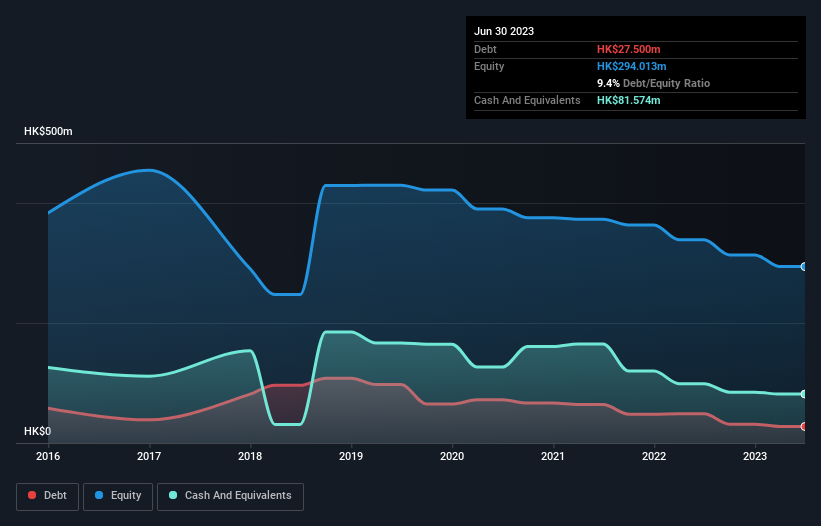Some say volatility, rather than debt, is the best way to think about risk as an investor, but Warren Buffett famously said that 'Volatility is far from synonymous with risk.' So it seems the smart money knows that debt - which is usually involved in bankruptcies - is a very important factor, when you assess how risky a company is. As with many other companies Hingtex Holdings Limited (HKG:1968) makes use of debt. But should shareholders be worried about its use of debt?
What Risk Does Debt Bring?
Debt assists a business until the business has trouble paying it off, either with new capital or with free cash flow. Part and parcel of capitalism is the process of 'creative destruction' where failed businesses are mercilessly liquidated by their bankers. However, a more usual (but still expensive) situation is where a company must dilute shareholders at a cheap share price simply to get debt under control. Having said that, the most common situation is where a company manages its debt reasonably well - and to its own advantage. The first step when considering a company's debt levels is to consider its cash and debt together.
Check out our latest analysis for Hingtex Holdings
What Is Hingtex Holdings's Net Debt?
The image below, which you can click on for greater detail, shows that Hingtex Holdings had debt of HK$27.5m at the end of June 2023, a reduction from HK$48.6m over a year. But it also has HK$81.6m in cash to offset that, meaning it has HK$54.1m net cash.

How Strong Is Hingtex Holdings' Balance Sheet?
The latest balance sheet data shows that Hingtex Holdings had liabilities of HK$71.5m due within a year, and liabilities of HK$8.61m falling due after that. Offsetting these obligations, it had cash of HK$81.6m as well as receivables valued at HK$50.4m due within 12 months. So it can boast HK$51.8m more liquid assets than total liabilities.
This surplus liquidity suggests that Hingtex Holdings' balance sheet could take a hit just as well as Homer Simpson's head can take a punch. On this view, lenders should feel as safe as the beloved of a black-belt karate master. Succinctly put, Hingtex Holdings boasts net cash, so it's fair to say it does not have a heavy debt load! There's no doubt that we learn most about debt from the balance sheet. But it is Hingtex Holdings's earnings that will influence how the balance sheet holds up in the future. So when considering debt, it's definitely worth looking at the earnings trend. Click here for an interactive snapshot.
In the last year Hingtex Holdings had a loss before interest and tax, and actually shrunk its revenue by 41%, to HK$195m. To be frank that doesn't bode well.
So How Risky Is Hingtex Holdings?
Although Hingtex Holdings had an earnings before interest and tax (EBIT) loss over the last twelve months, it generated positive free cash flow of HK$5.1m. So although it is loss-making, it doesn't seem to have too much near-term balance sheet risk, keeping in mind the net cash. We'll feel more comfortable with the stock once EBIT is positive, given the lacklustre revenue growth. The balance sheet is clearly the area to focus on when you are analysing debt. But ultimately, every company can contain risks that exist outside of the balance sheet. For example Hingtex Holdings has 3 warning signs (and 1 which is a bit concerning) we think you should know about.
When all is said and done, sometimes its easier to focus on companies that don't even need debt. Readers can access a list of growth stocks with zero net debt 100% free, right now.
Valuation is complex, but we're here to simplify it.
Discover if Hingtex Holdings might be undervalued or overvalued with our detailed analysis, featuring fair value estimates, potential risks, dividends, insider trades, and its financial condition.
Access Free AnalysisHave feedback on this article? Concerned about the content? Get in touch with us directly. Alternatively, email editorial-team (at) simplywallst.com.
This article by Simply Wall St is general in nature. We provide commentary based on historical data and analyst forecasts only using an unbiased methodology and our articles are not intended to be financial advice. It does not constitute a recommendation to buy or sell any stock, and does not take account of your objectives, or your financial situation. We aim to bring you long-term focused analysis driven by fundamental data. Note that our analysis may not factor in the latest price-sensitive company announcements or qualitative material. Simply Wall St has no position in any stocks mentioned.
About SEHK:1968
Hingtex Holdings
An investment holding company, designs, manufactures, sells, and trades in denim fabrics in Chinese Mainland, Hong Kong, Bangladesh, Egypt, Vietnam, Indonesia, Taiwan, Jordan, India, Pakistan, and internationally.
Adequate balance sheet with low risk.
Market Insights
Community Narratives



